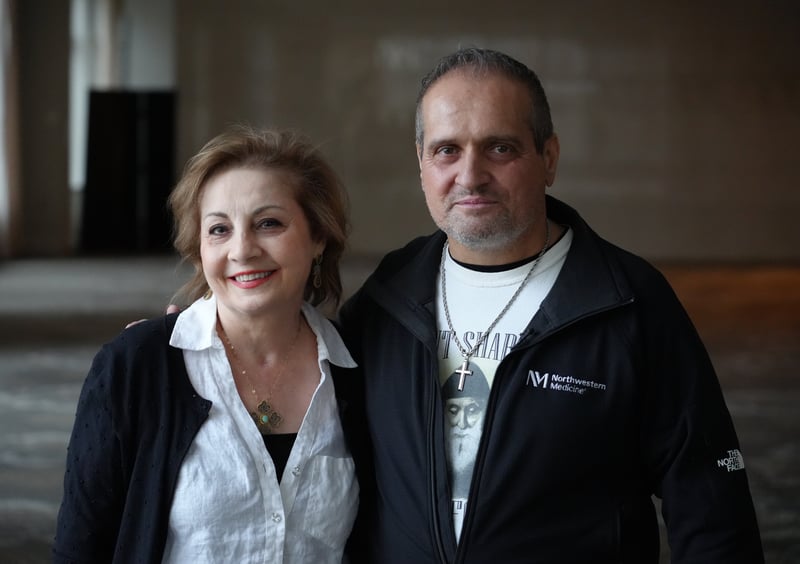Get Healthy!

- Posted March 15, 2023
New Lease on Life for Two Lung Cancer Patients After Pioneering Double-Lung Transplant
Retired nurse Tannaz Ameli was diagnosed with stage 4 lung cancer last winter. When chemotherapy failed, her doctors recommended hospice care.
But Ameli, of Minneapolis, had other ideas. She and her husband sought out a pioneering medical team at Northwestern Medicine in Chicago. Today, she is a survivor of a double-lung transplant -- just the second this team of specialists has successfully performed on stage 4 patients standing at hospice's door.
"I begged my doctors in Minnesota to consider a lung transplant, but they wouldn't do it. Luckily, my husband refused to give up and pushed for a second opinion,"said Ameli. "When I came to Northwestern Medicine, the first thing Dr. [Ankit] Bharat told me was, 'I think we can make you cancer-free,' and he delivered on those words."
In response to the success of this innovative surgery, the organization is launching a first-of-its-kind clinical program called Double Lung Replacement and Multidisciplinary Care (DREAM).
"These are patients diagnosed with some forms of lung cancer that have spread within the lung, are out of treatment options and have limited time to live,"said Bharat, chief of thoracic surgery and director of Northwestern Medicine Canning Thoracic Institute.
"The purpose of DREAM is to provide the most comprehensive multidisciplinary care for these complex patients,"he said in a Northwestern news release.
'Zero to 100'
To celebrate this achievement and this opportunity for patients with poor prognosis, the two patients and their doctors shared their stories at a press conference Wednesday.
Albert Khoury, a cement finisher from Chicago, received his new lungs at age 54 on Sept. 25, 2021.
Khoury had begun experiencing a cough with mucus, sneezing, chills and back pain in early 2020, and suspected COVID-19. Instead, he was diagnosed with lung cancer.
After chemotherapy treatments failed, Khoury was put on a ventilator in a hospital intensive care unit. Hospice care was being considered for him.
Instead, Northwestern Medicine surgeons determined that Khoury was a good candidate for a double-lung transplant because his tumor was localized to the chest, completely encasing both lungs, and hadn't spread to other parts of his body. Now, 18 months later, Khoury has no signs of cancer and has returned to work.
"My life went from zero to 100 because of Northwestern Medicine,"Khoury said. "You didn't see this smile on my face for over a year, but now I can't stop smiling. My medical team never gave up on me."
Like Khoury, Ameli's cancer was confined to the lungs and hadn't spread to other parts of the body.
The 64-year-old received her new lungs on July 13, 2022, only 10 days after being listed for transplant.
Neither Khoury nor Ameli needed any additional cancer therapy after their transplants.
Clearing the cancer
Lung cancers are the leading cause of cancer-related deaths in the United States with more people dying from them than colon, breast and prostate cancers combined.
The surgeons applied lessons they learned while performing double-lung transplants on COVID-19 patients to these transplants in cancer patients.
Among the innovations was developing a novel surgical technique to clear the cancer during surgery while minimizing its spread, an issue with attempts at other hospitals, doctors said.
"While lung transplantation is an accepted indication for certain forms of lung cancer by national organizations, it's infrequently performed due to the concerns of recurrence following surgery. Unlike the conventional technique of sequential transplants, this innovative technique involves putting the patient on full heart and lung bypass, delicately taking both cancer-ridden lungs out at the same time along with the lymph nodes, washing the airways and the chest cavity to clear the cancer, and then putting new lungs in,"Bharat said.
"These patients can have billions of cancer cells in the lungs, so we must be extremely meticulous to not let a single cell spill into the patient's chest cavity or bloodstream. We believe this technique can help reduce the risk of recurrence, which we learned through our experience with pioneering COVID-19 lung transplants,"Bharat explained.
In the COVID lung patients, post-transplant survival at one year was above 90%.
Tracking the DREAM
Providing donor lungs for these cancer patients should not disadvantage non-cancer patients waiting to receive new lungs, surgeons noted.
"We plan to mitigate any issues with donor lung availability using our newly launched 'lungs in a box' program, where our surgeons can repair damaged lungs and successfully use them for transplant,"said Dr. Rade Tomic, pulmonologist and medical director of the Northwestern Thoracic Institute Lung Transplant Program.
Doctors will track the first 75 DREAM patients in a new registry also called DREAM but standing for Double Lung Transplant Registry Aimed for Lung-limited Malignancies.
Participation in the research registry is voluntary. Enrolling in the registry isn't required as part of the DREAM clinical program.
"Encouraged by our first two patients, the goal of following these registry participants is to maintain close follow-up care by our multidisciplinary team and demonstrate good outcomes while learning new insights about lung cancer,"said Dr. Young Chae, a medical oncologist.
Northwestern Medicine invites patients interested in being evaluated for a lung transplant to call its referral line at 844-639-5864.
 Khoury back at work after his transplant
Khoury back at work after his transplant
More details about Northwestern Medicine's lung cancer and lung transplant program is available at nm.org.
More information
The American Cancer Society has more on lung cancer.
SOURCE: Northwestern Medicine, news release
